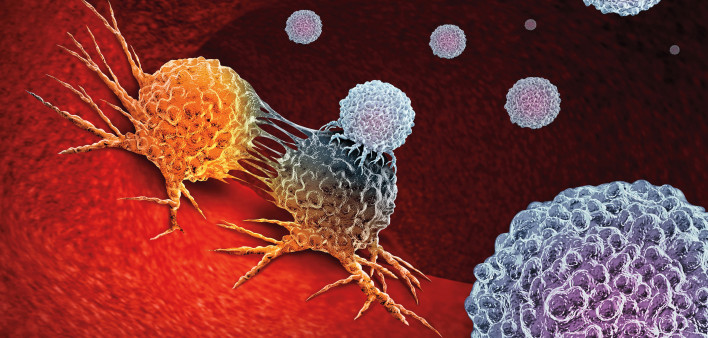CAR-T therapy demonstrated acceptable safety and effectiveness for HIV-positive people with lymphoma, with outcomes comparable to those observed for HIV-negative patients, according to study results presented at the American Society of Hematology (ASH) annual meeting.
People living with HIV are at higher risk for lymphoma than the general population. In fact, certain types of non-Hodgkin lymphoma are AIDS-defining cancers, meaning people with the condition meet the criteria for an AIDS diagnosis, while Hodgkin lymphoma is considered an AIDS-related cancer, meaning it occurs more often among HIV-positive people.
Yet people with HIV have been excluded from pivotal clinical trials of some of the latest innovations in cancer immunotherapy, which may make providers hesitant to prescribe such treatment and insurers less likely to cover it.
One of these, chimeric antigen receptor T-cell therapy, better known as CAR-T, involves removing a sample of a patient’s white blood cells and genetically modifying T cells—both CD4 “helper” cells and CD8 “killer” cells—to recognize and attack their cancer. For example, some CAR-T therapies reprogram T-cells to recognize the CD19 protein on B cells that grow out of control in people with lymphoma and leukemia. Then a large number of the engineered cells are manufactured in a lab and infused back into the same patient.
In the AMC-113 study, Stefan Barta, MD, of the Abramson Cancer Center at the University of Pennsylvania, and colleagues analyzed reports from more than a dozen U.S. clinical centers on people with HIV who received CD19-directed CAR-T therapy to treat relapsed or refractory lymphoma. The study is a collaboration between the National Cancer Institute’s AIDS Malignancy Consortium and the Center for International Blood and Marrow Transplant Research.
Barta presented results from an interim analysis of 19 evaluable patients. The median age was 55 years, and they had been diagnosed with HIV for a median of about 10 years. About 80% were men, about 40% were white, a similar proportion were Black and about 20% were Latino. Prior to CAR-T therapy, the median CD4 count was just over 200—but ranged as low as 0 in some cases—indicating advanced immune suppression. Most of those with an available HIV viral load had achieved viral suppression.
All the patients had some type of non-Hodgkin lymphoma, mostly large B-cell lymphoma. Most received Yescarta (axicabtagene ciloleucel). They first underwent conditioning chemotherapy to kill off some of their existing immune cells to make room for the new ones, followed by a single infusion of CAR T cells.
Just over half of the patients responded to treatment, including eight people (42%) with a complete response. These response rates are somewhat lower than those reported in clinical trials of HIV-negative people treated with Yescarta, but they are comparable to real-world outcomes seen in clinical practice, Barta noted.
CAR-T therapy can lead to severe immune-mediated side effects. Unleashing genetically modified T cells can trigger cytokine release syndrome (CRS), also known as a cytokine storm, and cause neurological side effects. CAR-T adverse events may include low blood pressure, organ failure, brain swelling, cognitive dysfunction and seizures.
In this analysis, about three quarters of patients developed CRS, mostly mild or moderate in severity. CRS resolved in most cases after a median of about four days. About one quarter developed neurological toxicity, including some severe or life-threatening cases (Grade 3 or 4), but these, too, resolved.
After a median six months of follow-up, the progression-free survival rate was 58%, and the overall survival rate was 63%. Most patients who died succumbed to cancer progression, but two died of bacterial infections.
“In the largest observational study of people living with HIV treated with CD19-directed CAR T cells, the therapy appears safe and effective, similar to reports in patients without HIV,” Barta said in a Penn Medicine news release. Barta told Healio that the results are “reassuring.”
Researchers are planning a prospective trial, AMC-112 (NCT05077527), to evaluate Yescarta CAR-T therapy for the treatment of HIV-positive people with several types of B-cell non-Hodgkin lymphoma.
HIV cure researchers are also evaluating CAR-T therapy in the hope that engineered T cells targeting HIV-infected immune cells could potentially eliminate the viral reservoir and bring about long-term remission.
A drawback of CAR-T therapy is that the personalized treatment is labor-intensive and expensive—Yescarta currently costs more than $350,000 for a single infusion—which limits its use for most of the millions of people living with HIV worldwide. While non-Hodgkin lymphoma has become rarer among HIV-positive people in the United States in the era of effective antiretroviral therapy, it is still common in middle-income countries, Barta told Healio.
Research is now underway in the cancer field to better manage side effects, scale up production and develop “off-the-shelf” CAR-T therapies that do not require the collection and custom modification of T cells from each individual patient.
Click here to learn more about immunotherapy for cancer.
Click here for more reports from the ASH annual meeting.







Comments
Comments